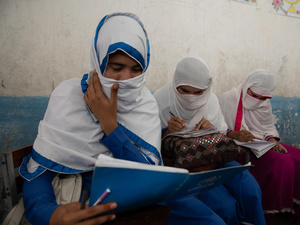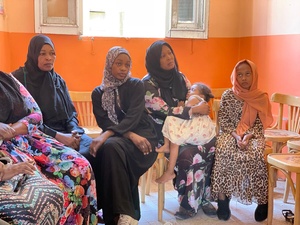From Separation to Safety: Rebuilding Childhood After Sudan’s War
From Separation to Safety: Rebuilding Childhood After Sudan’s War

UNHCR Registration staff, holds a Sudanese child after completing a registration process in Cairo. Unaccompanied and Separated Children are prioritized in the registration process to access UNHCR available services to the most vulnerable including cash assistance, case management and psychosocial support.
Two years since the war broke out in Sudan, the heartbreak of separation has become the defining experience for thousands of children. As violence spread and cities crumbled, parents made impossible choices—sending their children across borders with neighbors, strangers, or alone, in hopes they might find safety. For many, these journeys ended in exile. For some, they ended in silence.
Egypt, which shares a long border with Sudan, has seen over a million and half Sudanese arrive since April 2023. More than 4,300 unaccompanied and separated Sudanese children have registered with UNHCR, the UN Refugee Agency. These children—some as young as five—arrive traumatized, confused, and alone, often without any documents or clear understanding of where their families are. Some were separated during chaotic escapes, others left behind by parents who never made it out.
“We see children coming to our offices every day, asking if we can help them find their parents, their siblings, someone they know,” says Amr Saffour, Child Protection Officer at UNHCR Egypt. “They carry pieces of paper with phone numbers, old photos, memories they cling to.”
For UNHCR and its partners, supporting these children begins with protection. Registration is the first critical step—it helps prevent deportation, opens access to national services, and lays the foundation for family tracing and case management. Once registered, unaccompanied and separated children (UASCs) are assessed and referred for specialized support, including psychosocial care and interim foster arrangements.
But family reunification remains the heart of the response.
UNHCR teams work closely with community leaders, social workers, and child protection actors to trace family members, sometimes across several countries. In many cases, the process is painstaking and complex — names may be misspelled, relatives displaced, or records destroyed. But every successful match is a moment of hope.
Rayan’s story is one of them. Just 13 years old, she fled Khartoum with neighbors after her grandmother — who had raised her — refused to leave her home. Rayan’s mother had disappeared years earlier, and her father was never in the picture. When she arrived in Cairo, frightened and alone, she was temporarily sheltered by other refugees. Through a community contact, her case reached UNHCR, which helped arrange foster care in Alexandria.
Al Sadig Osman, a Sudanese refugee living in Egypt since 2005, received the call from a friend: “You already have two daughters. I think you’d make a great father to a third.” Without hesitation, he welcomed Rayan into his home.
“Since the day she arrived, she became one of us.
She’s like my own daughter.”
Today, Rayan is safe. She shares meals with her new family, laughs with her foster sisters, and is preparing to attend a Sudanese community learning center until her documents are in order. UNHCR continues to provide support while actively working to trace any remaining relatives.
Her case is one of thousands. Behind each number is a child looking for connection, stability, and belonging. UNHCR’s child protection teams are not only helping children survive — they are helping them rebuild their sense of family, identity, and future.
In some cases, reunification happens quickly. In others, it can take months or even years. But every effort is made to prioritize the best interests of the child and to keep siblings and family members together whenever possible.
While the scale of displacement continues to grow — with nearly 13 million people forced to flee Sudan — the stories of children like Rayan remind us of what’s at stake. Not just shelter or food, but the bonds that shape childhood itself.
“We cannot stop the war,” says Saffour, “but we can help these children find their families again. Or, at the very least, help them find a new one.”









